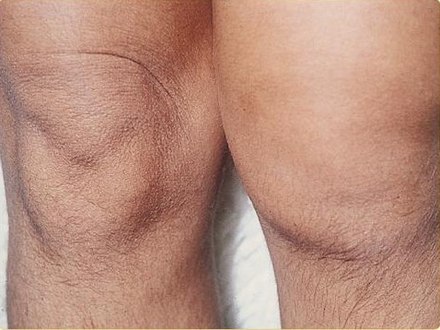Reactive Arthritis
Reactive arthritis, also known as Reiter's syndrome, is a form of inflammatory arthritis that develops in response to an infection in another part of the body. This condition is characterised by an autoimmune-like reaction, where the immune system mistakenly attacks the joints due to cross-reactivity with bacterial antigens. The term "reactive arthritis" is preferred over "Reiter's syndrome" due to Hans Reiter's association with Nazi war crimes.

Signs and Symptoms
Reactive arthritis manifests with a triad of symptoms: inflammatory arthritis of large joints, conjunctivitis or uveitis, and urethritis in men or cervicitis in women. These symptoms often appear within 1-3 weeks of the initial infection. A clinical mnemonic for reactive arthritis is "Can't see, can't pee, can't climb a tree," referring to the involvement of the eyes, urinary system, and joints.

Joint Symptoms
- Inflammatory arthritis typically affects fewer than five joints, with the knees and sacroiliac joints being common sites. The arthritis can be "additive" or "migratory."
- Enthesitis, particularly involving the Achilles tendon, can lead to heel pain.
- Dactylitis, or "sausage digit," is a distinctive feature characterised by diffuse swelling of a finger or toe.
Ocular Symptoms
- Mild bilateral conjunctivitis occurs in about 50% of men with urogenital reactive arthritis and 75% with enteric reactive arthritis.
- Uveitis can present with eye redness, pain, irritation, or blurred vision.
Genitourinary Symptoms
- Urethritis in men and cervicitis, salpingitis, or vulvovaginitis in women are common initial presentations.
- Prostatitis in men and other urogenital issues may also arise.
Dermatologic Symptoms
- Keratoderma blennorrhagicum, characterised by small hard nodules on the soles of the feet or palms, is diagnostic of reactive arthritis.
- Mucocutaneous lesions, including oral ulcers and penile lesions (circinate balanitis), are also observed.
Other Symptoms
- Gastrointestinal symptoms similar to Crohn's disease may be present.
- Cardiac manifestations, such as aortic regurgitation and pericarditis, occur in about 10% of cases.
Causes
Reactive arthritis is associated with the HLA-B27 gene and is triggered by infections, commonly genital infections with Chlamydia trachomatis, or enteric infections with Salmonella, Shigella, Yersinia, and Campylobacter. The exact mechanism remains unclear, but it is believed to involve an autoimmune response or deposition of bacterial antigens in the joints.
Diagnosis
Diagnosis involves clinical evaluation and laboratory tests. Swabs from the urethra, cervix, and throat, as well as cultures from urine and stool samples, can identify causative organisms. Blood tests for C-reactive protein, erythrocyte sedimentation rate, and the HLA-B27 gene may support the diagnosis.
Diagnostic Criteria
The American College of Rheumatology provides sensitivity and specificity guidelines for diagnosing reactive arthritis. These include episodes of arthritis lasting more than a month with urethritis, cervicitis, or conjunctivitis.
Treatment
The primary goal is to eradicate the underlying infection with appropriate antibiotics if still present. Symptomatic treatment includes:
- NSAIDs for pain relief
- Steroids, sulfasalazine, and immunosuppressants for severe cases
- Local corticosteroids for iritis
Prognosis
Reactive arthritis can be self-limiting, recurrent, chronic, or progressive. Severe symptoms typically last a few weeks to six months, with chronic arthritis or sacroiliitis occurring in 15-30% of cases. Most patients can expect to live normal life spans with adaptations to protect the affected organs.
Epidemiology
The exact incidence of reactive arthritis is difficult to determine, but studies indicate varying rates. For instance, in Norway (1988-1990), the incidence was 4.6 cases per 100,000 for chlamydia-induced reactive arthritis and 5 cases per 100,000 for those induced by enteric bacteria.
History
Initially described by Hans Conrad Julius Reiter, the condition was later renamed due to his Nazi affiliations and involvement in unethical human experimentation. The triad of symptoms was recognised by other physicians in the 19th century, under different names.
Notable Cases
Notable individuals with reactive arthritis include explorer Christopher Columbus, commentator Pat Buchanan, and musician Daniel Johns, among others.
Self-assessment MCQs (single best answer)
What is another name for Reactive Arthritis?
Which mnemonic is commonly used to describe the symptoms of Reactive Arthritis?
Which gene is associated with Reactive Arthritis?
What is the characteristic skin condition associated with Reactive Arthritis?
Which of the following is NOT a common initial presenting symptom of Reactive Arthritis?
What kind of infections commonly trigger Reactive Arthritis?
Which diagnostic test is NOT typically used in diagnosing Reactive Arthritis?
Which of the following is a common ocular symptom of Reactive Arthritis?
What percentage of Reactive Arthritis cases involve cardiac manifestations?
Who was a notable individual historically believed to have suffered from Reactive Arthritis?
Dentaljuce
Dentaljuce provides Enhanced Continuing Professional Development (CPD) with GDC-approved Certificates for dental professionals worldwide.
Founded in 2009 by the award-winning Masters team from the School of Dentistry at the University of Birmingham, Dentaljuce has established itself as the leading platform for online CPD.
With over 100 high-quality online courses available for a single annual membership fee, Dentaljuce offers comprehensive e-learning designed for busy dental professionals.
The courses cover a complete range of topics, from clinical skills to patient communication, and are suitable for dentists, nurses, hygienists, therapists, students, and practice managers.
Dentaljuce features Dr. Aiden, a dentally trained AI-powered personal tutor available 24/7 to assist with queries and provide guidance through complex topics, enhancing the learning experience.
Check out our range of courses, or sign up now!


